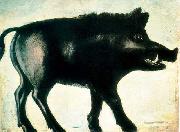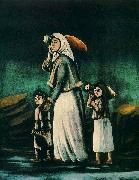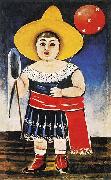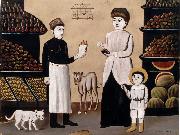Niko Pirosmanashvili Huiler la Reproduction de TableauAll Niko Pirosmanashvili Oil Paintings(born Niko Pirosmanashvili; May 5, 1862-1918) was a Georgian primitivist painter. Pirosmani was born in the Georgian village of Mirzaani to a pleasant family in the Kakheti province. His family owned a small vineyard. He was later orphaned and put in the care of his two elder sisters. He moved with them to Tbilisi in 1870. In 1872 he worked as a servant for wealthy families and learned to read and write Russian and Georgian. In 1876 he returned to Mirzaani and worked as a herdsman. Pirosmani gradually taught himself to paint. One of his specialties was painting directly into black oilcloth. In 1882 he opened a workshop in Tbilisi which was unsuccessful. In 1890 he worked as a railroad conductor, and in 1895 worked creating signboards. In 1893 he co-founded a dairy farm in Tbilisi which he left in 1901. Throughout his life Pirosmani, who was always poor, was willing to take up ordinary jobs including housepainting and whitewashing buildings. Although his paintings had some local popularity (about 200 survive) his relationship with professional artists remained uneasy; making a living was always more important to him than abstract aesthetics. |
|||

|
|||
|
|
|||
|
||||||||||||
| Niko Pirosmanashvili (born Niko Pirosmanashvili; May 5, 1862-1918) was a Georgian primitivist painter. Pirosmani was born in the Georgian village of Mirzaani to a pleasant family in the Kakheti province. His family owned a small vineyard. He was later orphaned and put in the care of his two elder sisters. He moved with them to Tbilisi in 1870. In 1872 he worked as a servant for wealthy families and learned to read and write Russian and Georgian. In 1876 he returned to Mirzaani and worked as a herdsman. Pirosmani gradually taught himself to paint. One of his specialties was painting directly into black oilcloth. In 1882 he opened a workshop in Tbilisi which was unsuccessful. In 1890 he worked as a railroad conductor, and in 1895 worked creating signboards. In 1893 he co-founded a dairy farm in Tbilisi which he left in 1901. Throughout his life Pirosmani, who was always poor, was willing to take up ordinary jobs including housepainting and whitewashing buildings. Although his paintings had some local popularity (about 200 survive) his relationship with professional artists remained uneasy; making a living was always more important to him than abstract aesthetics. |
||||||||||||
|
|
||||||||||||
| ID de tableau:: 92704 A Black Wild Boar A Black Wild Boar Date 1906(1906) Medium oil on oilcloth Dimensions 74 X 58 cm (29.1 X 22.8 in) TTD Date 1906(1906) Medium oil on oilcloth Dimensions 74 X 58 cm (29.1 X 22.8 in) TTD |
||||||||||||
|
|
||||||||||||
| ID de tableau:: 93046 A Peasant Woman with Children Going to Fetch Water A Peasant Woman with Children Going to Fetch Water Date 1900s Medium oil on oilcloth Dimensions 92 X 111 cm (36.2 X 43.7 in) TTD Date 1900s Medium oil on oilcloth Dimensions 92 X 111 cm (36.2 X 43.7 in) TTD |
||||||||||||
|
|
||||||||||||
| ID de tableau:: 93053 Feast with Organ-Grinder Datiko Zemel Feast with Organ-Grinder Datiko Zemel Medium English: Oil painting on oilcloth עברית: ציור שמן על שעוונית Dimensions 198 X 106 cm (78 X 41.7 in) TTD Medium English: Oil painting on oilcloth עברית: ציור שמן על שעוונית Dimensions 198 X 106 cm (78 X 41.7 in) TTD |
||||||||||||
|
|
||||||||||||
| ID de tableau:: 93289 Little Girl with a Patterned Balloon Little Girl with a Patterned Balloon Date c. 1910-1912 Medium English: Oil painting on oilcloth עברית: ציור שמן על שעוונית Dimensions 64 x 37 cm (25.2 x 14.6 in) TTD Date c. 1910-1912 Medium English: Oil painting on oilcloth עברית: ציור שמן על שעוונית Dimensions 64 x 37 cm (25.2 x 14.6 in) TTD |
||||||||||||
|
|
||||||||||||
| ID de tableau:: 93290 A Tatar Fruiterer A Tatar Fruiterer Date from 1910(1910) until 1912(1912) Medium oil on cardboard Dimensions 75 x 106 cm (29.5 x 41.7 in) Date from 1910(1910) until 1912(1912) Medium oil on cardboard Dimensions 75 x 106 cm (29.5 x 41.7 in) |
||||||||||||
|
|
||||||||||||
| Artiste précédent Artiste prochain | ||||||||||||
|
|
||||||||||||
|
Niko Pirosmanashvili (born Niko Pirosmanashvili; May 5, 1862-1918) was a Georgian primitivist painter. Pirosmani was born in the Georgian village of Mirzaani to a pleasant family in the Kakheti province. His family owned a small vineyard. He was later orphaned and put in the care of his two elder sisters. He moved with them to Tbilisi in 1870. In 1872 he worked as a servant for wealthy families and learned to read and write Russian and Georgian. In 1876 he returned to Mirzaani and worked as a herdsman. Pirosmani gradually taught himself to paint. One of his specialties was painting directly into black oilcloth. In 1882 he opened a workshop in Tbilisi which was unsuccessful. In 1890 he worked as a railroad conductor, and in 1895 worked creating signboards. In 1893 he co-founded a dairy farm in Tbilisi which he left in 1901. Throughout his life Pirosmani, who was always poor, was willing to take up ordinary jobs including housepainting and whitewashing buildings. Although his paintings had some local popularity (about 200 survive) his relationship with professional artists remained uneasy; making a living was always more important to him than abstract aesthetics. |
||||||||||||
|
|
||||||||||||
|
CONTACTER DES Etats-Unis |










